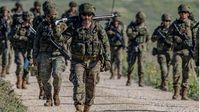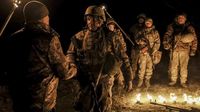The ongoing conflict between Russia and Ukraine has ignited discussions across Europe about the potential for a wider war, raising concerns about the possibility of a third world war. As tensions escalate, many are left wondering what would happen if Spain were to find itself embroiled in such a conflict.
According to Global Fire Power, Spain's active military personnel consists of 119,665 members, which includes 23,000 in the Spanish Air and Space Force, 20,840 in the Navy, and 75,825 in the Army. Additionally, there are around 15,150 reservists available to support military operations if necessary.
In the event of a war, the first to be deployed would be the military personnel. Following them, volunteers, known as reservists, would be called upon. Reservists are categorized into three groups: those of special availability, volunteers, and obligatory reservists. If there is a shortage of special availability and volunteer reservists, the Spanish government could conscript any citizen into the military, but this would require authorization from Congress.
The Military Career Law outlines the criteria for obligatory reservists, stating that any citizen between the ages of 18 and 53 who meets the necessary medical requirements can be drafted. Priority would be given to those aged 19 to 25. The process involves notifying individuals of their status as reservists and providing them with a questionnaire regarding their health and preferences for service.
Citizens who wish to refuse military service can declare conscientious objection. The law allows individuals to express their objection to serving in the armed forces or other organizations that require the use of weapons. However, the acceptance of this declaration is at the discretion of the competent council. If rejected and an individual still refuses to serve, the state may pursue legal action, as stated in Article 30 of the Spanish Constitution, which affirms that Spaniards have both the right and the duty to defend their country.
The war in Ukraine, which began in February 2022 with Russia's invasion, has highlighted the fragility of peace in Europe. The conflict has drawn international attention, with Ukrainian President Volodymyr Zelensky traveling extensively to seek military and financial support. The United States has been a significant contributor, providing substantial resources to bolster Ukraine's defense against Russian aggression. European nations have also stepped up, offering financial assistance and military supplies.
As the situation continues to unfold, NATO remains on high alert, and European leaders are urging citizens to prepare for potential emergencies. Countries like Denmark, Finland, Norway, and Sweden have begun distributing survival manuals to their populations, advising them to stockpile food, water, and medical supplies in case of a nuclear conflict or other crises.
In Spain, the military's size is relatively small compared to the European average, with approximately 2.4 military personnel per 1,000 citizens, compared to the European average of 3.6. In the event of a significant military mobilization, the state would likely call upon all men and women aged 18 to 53, regardless of prior military experience. This raises questions about the implications of such conscription and the potential societal impact.
Concerns about the viability of conscientious objection are also prevalent. While the law provides a framework for individuals to opt out of military service, the acceptance of these objections can be inconsistent, leading to uncertainty for those who may not wish to serve. The potential for legal repercussions looms large for those who refuse to comply with conscription orders.
As Europe grapples with the realities of modern warfare, the prospect of a broader conflict remains a pressing concern. The ongoing war in Ukraine serves as a stark reminder of the delicate balance of power in the region and the potential consequences of geopolitical tensions. With the specter of conscription looming, Spaniards are left to ponder their roles in a rapidly changing world.
In summary, the possibility of war has prompted discussions about military preparedness and the obligations of citizens in Spain. With a relatively small active military force, the country must consider how it would respond to a call to arms. The legal framework surrounding conscription and conscientious objection will play a crucial role in shaping Spain's response to any potential conflict.





